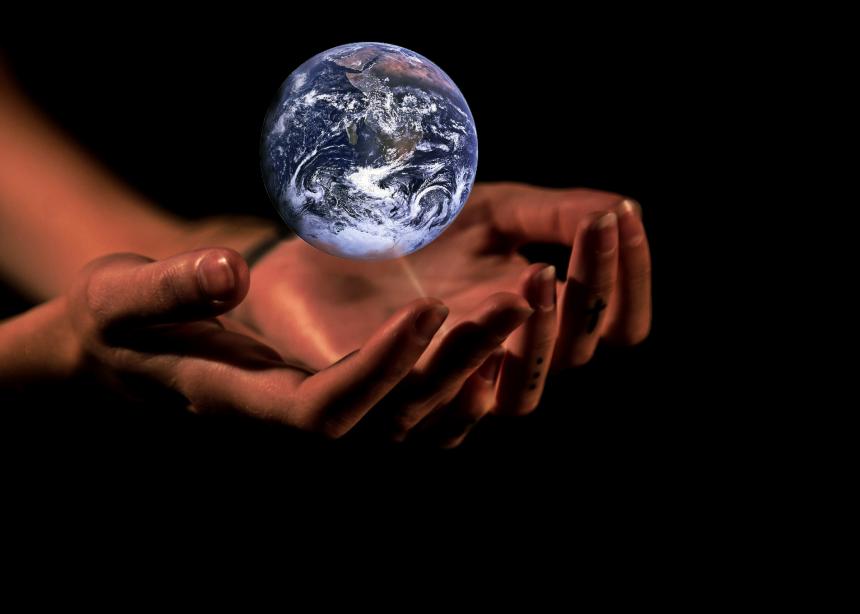Last December, unbeknownst to each other, my daughter-in-law and I bought each other bamboo toothbrushes as Christmas presents. Earlier in the year, she had heard me lament the plastic toothbrushes I was regularly contributing to the local landfill. In the larger scheme, those toothbrushes didn’t seem very important, but the long life of those plastic handles was an uncomfortable reality. The bamboo handles can be recycled in our regular green bin collection.
Our planet is in trouble. Unusual weather patterns are leading to extreme temperatures, devastating storms, fierce wildfires and massive flooding. Climate scientists warn us that human beings have little more than a decade in which to change our behaviour before Earth’s environment suffers major irreversible damage. A report issued recently by the UN Intergovernmental Panel on Climate Change calls for “rapid and far-reaching transitions in energy, land, urban and infrastructure, . . . and industrial systems,” in order to curb serious global warming.
If you’re like me, you would rather not think about these things. The predictions paint a picture of a dire future for the young people I love. I don’t want to imagine what life will be like for the children yet unborn. Faced with the enormity of the environmental problems, and their complex, systemic nature, we doubt that there is much we can do to change the course of disaster.
Fear of that future can easily lead to denial, or panic or paralysis. Knowing that parts of our beautiful planet are in serious danger, and that we humans continue to spoil our home, some of us struggle with a malady mental health experts have identified as “climate grief” or “apocalypse fatigue.”
I don’t understand all the science behind global warming, and I don’t find it helpful to argue about it. As Christians, we believe that God created this wild and beautiful universe and declared it good, that the Creator loves every part of it, from the most basic mineral and the tiniest of organisms to the vast oceans and the expanse of outer space. We love the Earth, and we take seriously the biblical command to love our neighbours as ourselves. Yet how can we express neighbourly love if we’re poisoning the air someone breathes or helping to cause the floods that destroy someone’s home?
For years, my household has done practical things to care for the Earth by reducing consumption, recycling and re-using what we can. But it’s clear that we need to do much more as a response to global warming.
The place to begin, says Canadian climate scientist Katharine Hayhoe, is to “start with the heart,” to speak together of the values we share concerning our loved ones, our local communities and the natural world. Then those shared values can rally us toward concrete solutions.
As individuals, and as faith communities, we can summon the courage and the discipline to move—right now—beyond anxious paralysis to actions of hope for the good of all.
In this issue’s feature, beginning on page 4, Anthony G. Siegrist and Scott Morton Ninomiya offer some ideas of how our church communities can work together on this important task. On page 18, you can read about a Saskatchewan congregation that took the plunge and invested in solar energy for its church building. And, admirably, some avid cyclists brave Winnipeg winters for the sake of personal health and the health of the environment. Their stories are on page 24.
As we seek to love our earthly home and the neighbours God has given us, maybe our task is not as impossible as we think. First, we humbly identify ways in which we have been complicit—either individually or corporately—in Earth’s deterioration. Next, we simply take another step toward protecting the Earth. Then another step. And then another.
For Lent this year the organization Citizens for Public Justice is inviting Canadians to participate in the “Give it up for the Earth” campaign by challenging us, between March 6 and April 18, to “give up” some of our personal or household greenhouse gas emissions, inviting others to join us. See more at cpj.ca/fortheearth.
In a TEDx talk entitled, “The disarming case to act right now on climate change,” a young climate activist urges listeners to do something concrete. “Once we start to act, hope is everywhere,” says Greta Thunberg.
Walking together in faith, you and I can find strength to move beyond paralysis, even if our movement starts with tiny steps. We know that there is always more to learn, more to do, on the path of creation care. The Creator of the universe is walking with us.
Read more editorials by Virginia A. Hostetler:
The adventure of leadership
In conversation
New things ahead
'Fear not'
A season of change
—Corrected Feb. 28, 2019




Add new comment
Canadian Mennonite invites comments and encourages constructive discussion about our content. Actual full names (first and last) are required. Comments are moderated and may be edited. They will not appear online until approved and will be posted during business hours. Some comments may be reproduced in print.